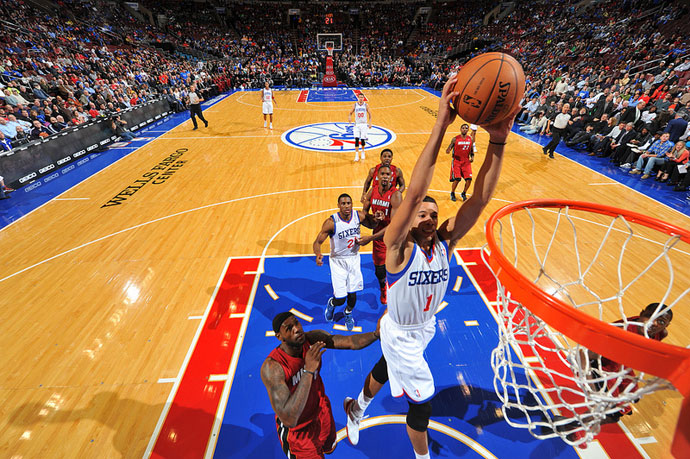NBA Rookie Puts His Salary In Trust Fund He Can’t Touch

Image via Flickr/ Philadelphia 76ers
A rookie NBA player has decided to put most of his first two years’ earnings in a trust fund that he cannot touch for the next three years. The Philadelphia 76ers player Michael Carter-Williams’ prudent decision is a rare one and is being lauded in the sports community.
His contract guarantees he’ll make $4.5 million in his first two seasons, and he could make up to $10 million over the course of his contract, according to Philly.com. This base salary is deposited directly into the trust fund. In the meantime, Carter-Williams is living off endorsement deals with Panini trading cards and Nike.
The 22-year-old’s decision came at the behest his mother, Mandy Carter-Zegarowski. She and her best friend are now running his management team, opting to take a proactive approach to make sure the player still has money a few years down the road.
“Our goal is to work with Michael to manage his money in a way that will secure his long-term financial future,” Carter-Zegarowski said in a statement to ABC News. “Right now, the focus is not only to save as much as possible, but also to use his unique position to serve as a role model and give back to the communities that continue to support him and his career.”
Reactions to the Announcement
Financial experts say the situation is unusual for several reasons.
David Friedman, president of Wealth-X, a company that provides data on high-worth individuals, explained that the player is using his trust fund in an unconventional way. Trust funds are generally used to pass money onto other family members, he explained to ABC News. It’s untraditional for young people without families of their own to open trust funds for themselves.
Tax expert and attorney Kelly Phillips Erb agreed that it was odd. She said to ABC News that most multimillionaires don’t have their parents helping manage their bank accounts. “Once you’re no longer a minor, it’s difficult for your parents to control your wealth,” she told ABC News. “It’s not theirs. It’s his, no matter the intentions or if he’s living in their house.”
Despite the unusual circumstances, Carter-Williams’ fiscally responsible move is garnering endless support, even from financial experts. Phillips Erb said, “Even if an athlete has a million dollars today, it has to last until you’re 65.” She added, “In professional sports in particular, you’re going to have health problems and your knees are going to go out. His parents are very smart to know he has a shelf life though they hope he’ll go on to good things. But they don’t want him to blow his money on a Lamborghini.”
Those in the sports world are equally supportive. Matt Moore of CBS Sports commented, “This is genius. Every rookie should do this. Even if it means short-term pain, it’s such a better approach.”
Financial Problems of Professional Athletes: A Longstanding Trend
Professional athletes have a trend of going broke and declaring bankruptcy, and sports analysts know the story all too well. Rookies sign multimillion-dollar contracts straight out of college, going from rags to riches overnight. With no financial training to speak of, the athletes view their salaries not as a certain number of millions of dollars, but rather as infinite pools of wealth to draw from.
Experts say a sense of entitlement is also at play. Star athletes may have grown up always hearing how great they are, so when they finally get the big payout, they feel like they’re completely entitled to a big house and fancy cars. They don’t think about the fact that they’ll still have mortgage payments long after they leave the court or field.
Such unchecked spending is a sure way to get into financial hot water. Sports Illustrated reported in 2009 that 60 percent of former NBA players are completely broke within five years of retirement. The situation is even more dire for former NFL players, 78 percent of whom are bankrupt or under serious financial stress within just two years of retirement.
Carter-Williams is barely in the big leagues and is already taking steps to avoid a penniless fate. He’ll probably still be playing when he can access his trust fund in three years; ESPN reported in 2011 that the average NBA career is 4.8 years. In the meantime he’ll be able to plan for the future and develop good spending habits, all while he’s not tempted to spend the millions he’s put away.









































